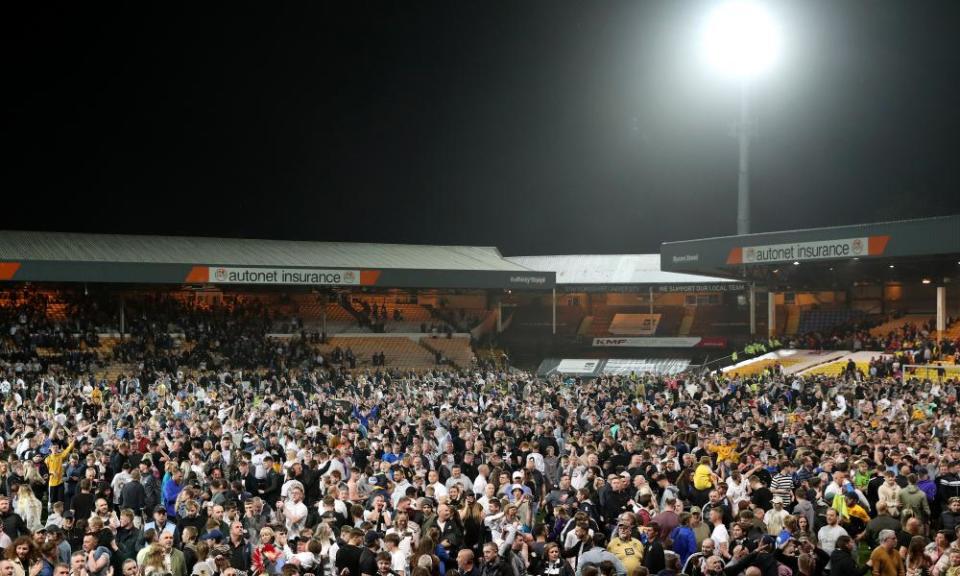Authorities searching for solutions after pitch invasions cause disquiet

The end of the season is the most emotional time in the footballing year. It’s when teams lift trophies and escape the drop and when fans give a salute to their heroes, with the Premier League promising to come to a spectacular conclusion in the last round of fixtures on Sunday. But in 2022 the season’s climax has seen emotion turn to disorder, once more causing disquiet at all levels of the game.
Pitch invasions by supporters have caused trouble at Nottingham Forest, Northampton, Everton and Port Vale this week, as playoff fixtures and relegation matches ended with players being targeted by fans. On Thursday Robert Biggs, a 30-year-old Forest season-ticket holder, was jailed for 24 weeks for running on to the pitch and head-butting Sheffield United’s Billy Sharp.
Related: Fans’ ugly behaviour is not just about football – it’s about society | Jonathan Wilson
That same night there was a pitch invasion at Goodison Park after Everton’s dramatic 3-2 win over Crystal Palace that staved off the threat of relegation from the Premier League. The Palace manager, Patrick Vieira, was involved in a confrontation with an Everton fan where Vieira appeared to aim a kick at a man taunting him. The Football Association and Merseyside police said separately they were looking into the incident.
Meanwhile the government threatened five-year bans on fans convicted of selling or taking class A drugs, as Boris Johnson said “middle-class cokeheads” were driving crime across the country.
The Manchester University academic Geoff Pearson, a leading voice on fan culture and crowd safety, has argued that a “carnival” culture among some fans has been exacerbated by the absences from stadiums caused by the pandemic. But he also says behaviours have been unlearned during that time and punishments of the like imposed on Biggs are necessary to turn the tide.
“There is an accountability issue,” he says, “and it takes time to correct that behaviour. But if you look back to the 80s people said hooliganism was intractable and between 1988 and 1994 we got a grip of it quite quickly. We’re now in a much better place than then and police already have the tools they need. But ultimately it is fans who will start to re-establish boundaries and that will be enforced by people being banned.”
Football authorities are clear, too, that the legal framework exists to get the current problems under control. As a statement on pitch invasions from the Professional Footballers’ Association put it: “These are predictable events, it is a criminal offence, and it is unacceptable.”
But the FA, English Football League and Premier League have begun new rounds of discussions over how to deal with the post-Covid rise in disorder.
This week the EFL said it would support the use of measures to enforce “capacity reduction” on clubs whose fans invade the field or engage in other prohibited behaviour. Reductions could mean blocks of support being closed off, targeting areas perceived as being home to troublemakers. It could also, however, simply mean restricting fans from sitting in the first 10 rows of any stand and netting them off, so as to stop incursions physically.
Other ideas being discussed include a focus on stewarding. An absence of neon tabards around football pitches has raised eyebrows among some observers, with calls for clubs to spend more money on stewarding. Pearson dismisses this as a practical solution. “You can’t stop home fans getting on the pitch with policing,” he says. But he argues that improving intelligence about crowds among police and stewards is crucial. One of the proposals being discussed by authorities is to take stewards from visiting clubs on away fixtures, the better to apply informed crowd control.
The Premier League said that it had told its clubs to remind fans that pitch invasions are illegal before the competition’s final round of fixtures kicks off on Sunday. “Clubs will have all necessary procedures in place to ensure the players, staff, match officials and fans are protected”, a spokesperson said.
Football’s stakeholders say their top priority is protecting the safety of those playing or coaching the game, and that their willingness to consider all corrective measures is a sign of how seriously they take the current problem. On this, they are in line with the police. England’s most senior footballing officer, chief constable Mark Roberts, said he was “alarmed” by the new spate of incidents.
“Fans entering the pitch … [have] at times resulted in assaults and altercations with players, managers and club staff – which is totally unacceptable,” Roberts said. “The pitch is the players’ place of work and like everyone else, they should be able to feel safe. It is the responsibility of clubs to ensure that fans can view matches in safety and we will continue to work with clubs to see what can be done to help prevent these incidents in future.”

 Yahoo Sport
Yahoo Sport 





































